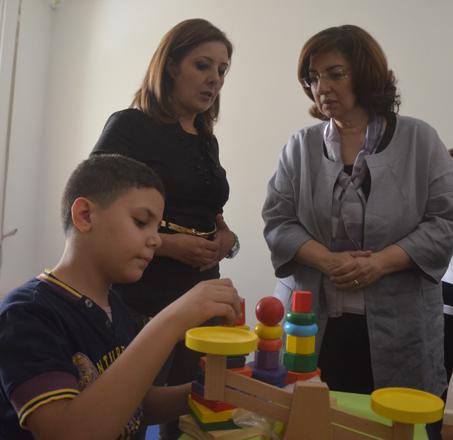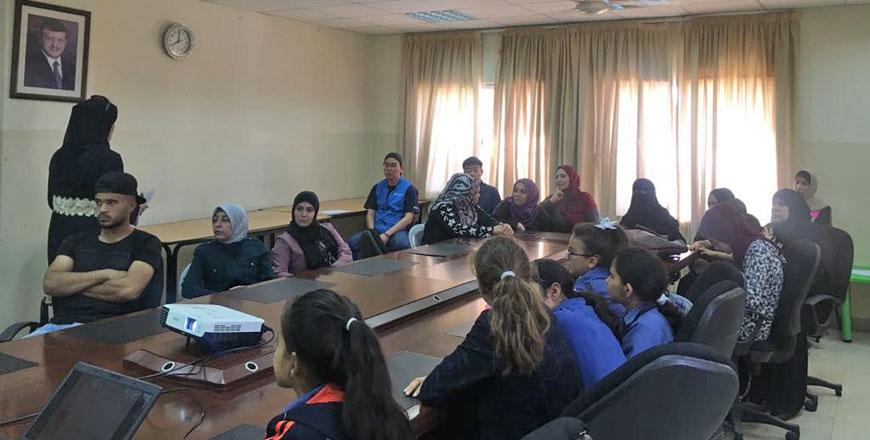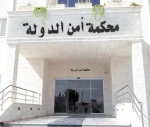You are here
Family is frontline of support for children with disabilities — Abu Hassan
By Muath Freij - Aug 12,2015 - Last updated at Aug 12,2015

Social Development Minister Reem Abu Hassan speaks to Jihan Khoury, the mother of a nine-year-old autistic boy, during a visit to the Society for Care of Gifted Autistic Children in Amman on Tuesday (Photo by Muath Freij)
AMMAN –– People with disabilities including autistic children have political, civil, economic, social and cultural rights guaranteed by law and should be respected by individuals and institutions, Social Development Minister Reem Abu Hassan said on Tuesday.
She highlighted the role of family as the first line of support for this category, especially mothers.
The minister made her remarks during the graduation ceremony of a training course held by the Society for Care of Gifted Autistic Children (SCGAC) for women whose children suffer from the disorder.
In her speech at the ceremony, she seized the opportunity to convey several “media messages” regarding the rights of people with disabilities and the role of stakeholders in safeguarding these rights and contributing to the care of this group.
Abu Hassan commended the role of
SCGAC, especially as the newly established society started its activities with two workshops targeting mothers.
She stressed that care and rehabilitation centres for people with disabilities are important, including those providing boarding services. In an apparent response to critics, Abu Hassan said that such institutions contribute JD20 million a year to the national economy and have created hundreds of jobs.
She said boarding schools are particularly important for children neglected or abused by their families.
The minister highlighted the need for society to help children with disabilities by reporting any abuses they might come across. Meanwhile, she said her ministry has prepared regulations and benchmarks related to early detection of disabilities and has received feedback on these by major stakeholders.
The ministry plans to “open a dialogue within the community… to draw further feedback”.
Abu Hassan presented certificates to graduates and sat with them for a long chat on autism and what needs to be done to increase public awareness on the disorder.
Jameel Abu Tarboush, SCGAC consultant and the designer and instructor of the free-of-charge course, said the 20-hour training covered autism detection and assessment tests, applying international techniques. The women were also taught how to make teaching aids from recycled items.
Abu Tarboush highlighted the fact that the assessment and rehabilitation of autistic children is costly and unaffordable for many families.
Haneen Atrash, whose six-year-old suffers from autism, said the course was beneficial.
“We learned new techniques on how to improve our children’s language production and how to enhance eye contact with them,” she added.
“I was searching for courses to increase my knowledge but the prices were not affordable,” Atrash told The Jordan Times.
Jihan Khoury, a mother of a nine-year-old autistic boy, said she learned techniques like how to reshape her child’s behaviour and help him without professional assistance.
Another graduate, Um Issa, called for integrating autistic children in regular education, adding that it is too difficult to find a school for an autistic child.
SCGAC President Yousef Damra said that having contacts with mothers is the most feasible way to detect gifted autistic children, who constitute around 10 per cent of autism cases globally.
Damra said the society plans to coordinate with colleges and universities to provide free training for undergraduate special education students to build a generation of qualified trainers in Jordan.
Related Articles
AMMAN — The Ministry of Social Development and the Society for the Care of Gifted Autistic Children (Autismjo) on Monday concluded the first
AMMAN — The Society for the Care of Gifted Autistic Children (Autismjo) held a workshop on Tuesday to teach autistic children drawing as par
AMMAN — The Society for Care and Rehabilitation of Creative Autistic Children held on Tuesday a training course for 15 mothers of autistic c
















